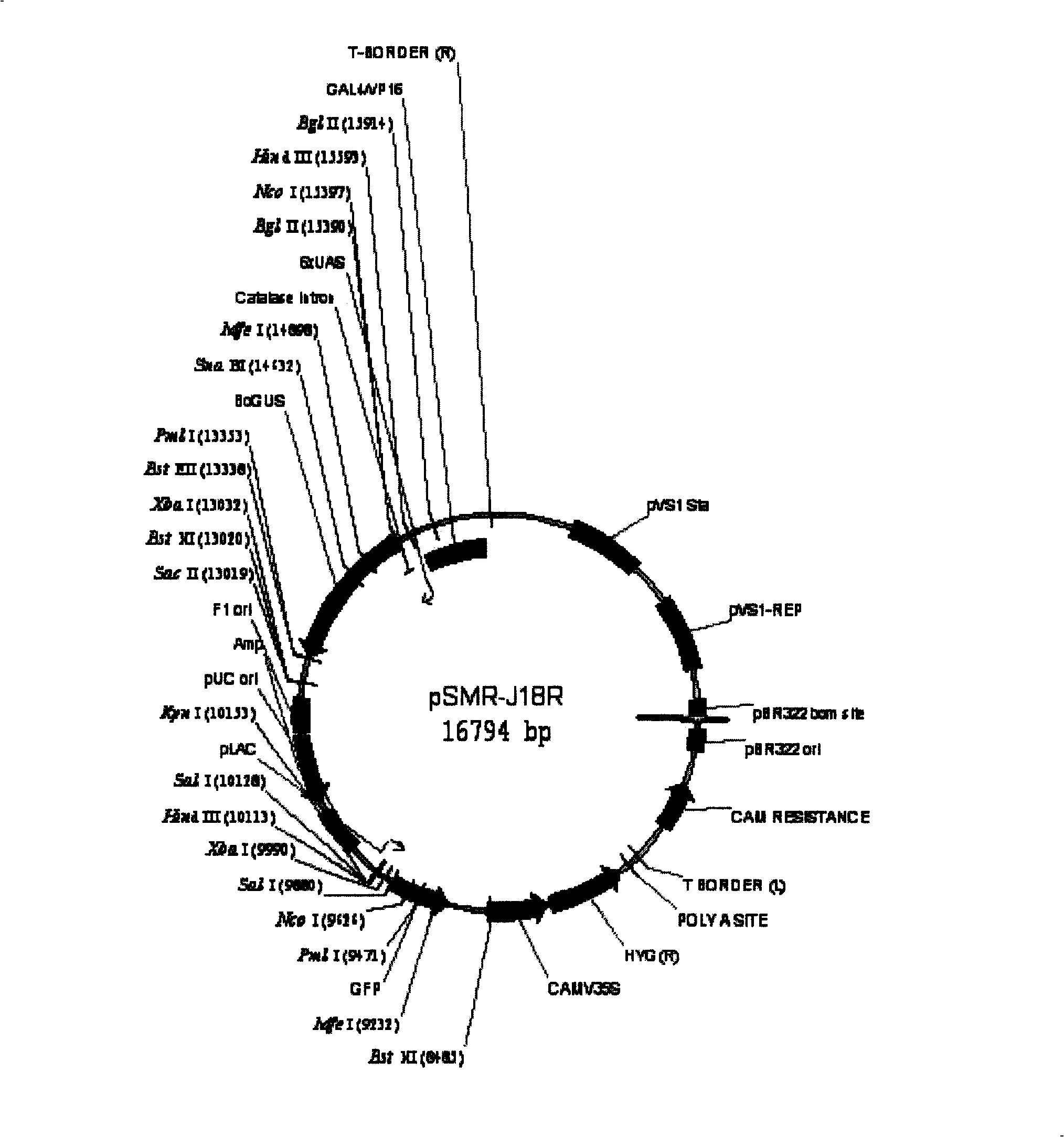Gene for controlling rice ear sprouting period and its uses
A technology of heading date and gene, which is applied in the field of controlling the gene of rice heading date, can solve the problems of time-consuming and labor-intensive, and achieve the effect of high efficiency and fast speed
- Summary
- Abstract
- Description
- Claims
- Application Information
AI Technical Summary
Problems solved by technology
Method used
Image
Examples
Embodiment 1
[0036] Example 1: Isolation and cloning of OsCM2 gene
[0037] 1. Create a mutant library (T0 generation)
[0038] The vector pSMR-J18R was donated by Australia CAMBIA Laboratory (Center for the Application of Molecular Biology to International Agriculture), such as figure 1 , Randomly insert T-DNA (including Enhancer Trap) (Springer P S. Gene Traps: Tools) into the genome of japonica rice variety Zhonghua 11 (Oryza sativa L.subsp.japonica cv.Zhonghua 11) mediated by Agrobacterium EHA105 for plantdevelopment and genomics. Plant Cell, 2000, 12: 1007-1020) to create a mutant library. The mutant library was constructed according to the method described by Wu et al. (Wu et al., Development of enhancer traplines for functional analysis of the rice genome. Plant J, 2003, 35:418-427). At present, about 100,000 independent transformants have been obtained.
[0039] 2. Field Screening of T1 Generation Tiller Characters
[0040] 3000 T1 generation seeds were selected from the T0 generation...
Embodiment 2
[0055] Example 2: Gene expression analysis
[0056] The mutant obtained by the present invention is caused by T-DNA randomly inserted into the rice genome. The T-DNA contains Enhancer Trap, and the reporter gene on it has a small sheared promoter, which contains only TATAbox and transcription initiation point. , Is not enough to initiate reporter gene expression, but can only be expressed with the help of adjacent enhancer elements. By detecting the expression pattern of the reporter gene, the expression pattern of the gene controlled by the enhancer element can be judged. GUS staining results for mutants, such as Figure 8 , All expressed in roots, stems and leaves, which is the same as the expression pattern of this gene in Arabidopsis (Jenny Eberhard et al., Cytosolic and plastidic chorismate mutase isozymes from Arabidopsis thaliana: molecular characterization and enzymatic properties. Plant Journal, 1996 , 10(5):815-821). This also proves from another angle that T-DNA is inse...
Embodiment 3
[0057] Example 3: RNAi (RNA interference) transformation to verify gene function
[0058] Design RNAi fragments in the first exon and the last exon of OsCM2 gene. Primer sequence: 1588Si1 5'ggg gac cac ttt gta caa gaa agc tgg gt AAACGGAGATGAAGAAAGATCC 3', 1588Ai1 5'ggg gac aag ttt gta caa aaa agc agg ct GTCACTTTGGAGGACAATGCTG 3', gtag tac 2 gt gatt agc tgg gt CTTACCTTGGCGTGCAGAAC 3', 1588Ai2 5'ggg gac aag ttt gta caa aaa agc agg ct GAGCTGTGGAGGATCAGCAG 3'. The total volume of the PCR reaction system is 20μl, rice genomic DNA template 1ul (about 50ng), 1×Taq enzyme reaction buffer, 25mM MgCL 2 1.2ul, 2mM dNTP 1.5ul, 10uM primer 0.2ul, 50% glycerol 2ul, 0.3 unit rTaq enzyme (Takara company), add ddH 2 O to 20μl. The reaction procedure is: denaturation at 94°C for 3 minutes, 50s at 94°C, 80s at 55°C, and 35 cycles at 72°C for 90s, and extension at 72°C for 5 minutes. The two fragments are amplified in 10 tubes. The PCR products are collected and purified in 2 1.5ml centrifuge tubes. ...
PUM
 Login to View More
Login to View More Abstract
Description
Claims
Application Information
 Login to View More
Login to View More - R&D
- Intellectual Property
- Life Sciences
- Materials
- Tech Scout
- Unparalleled Data Quality
- Higher Quality Content
- 60% Fewer Hallucinations
Browse by: Latest US Patents, China's latest patents, Technical Efficacy Thesaurus, Application Domain, Technology Topic, Popular Technical Reports.
© 2025 PatSnap. All rights reserved.Legal|Privacy policy|Modern Slavery Act Transparency Statement|Sitemap|About US| Contact US: help@patsnap.com



